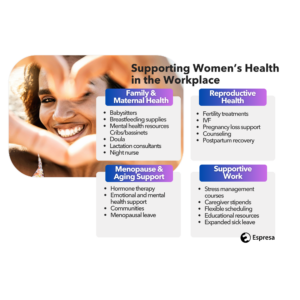Women’s Health Is a Workplace Issue—Time to Act
Despite making up nearly half the workforce, women still face significant gaps in healthcare support. From reproductive health to menopause, inadequate workplace benefits force many to navigate critical life stages without the care they need. The result? Increased absenteeism, declining productivity, and talented employees leaving careers behind.
The good news: HR leaders have the power to change this. By addressing these gaps, companies can create an inclusive, health-forward workplace that supports women at every stage of life. It’s not just about benefits—it’s about business success, employee well-being, and closing the care gap once and for all.
In this article, we’ll cover the following:
- Why Gaps in Women’s Health Persist
- The Business Case for Prioritizing Women’s Health
- Closing the Gap with Lifestyle Benefits
- A Call to Action for Employers
Why Gaps in Women’s Health Persist
Despite medical advancements, some workplaces still treat women’s health as a secondary priority. Many conditions—such as endometriosis, PCOS, and menopause—remain widely misunderstood or underdiagnosed. Meanwhile, maternal health challenges, including pregnancy loss and postpartum recovery, often go unsupported by workplace policies.
Beyond medical care, women frequently juggle caregiving responsibilities, from childcare to eldercare, placing additional stress on their mental and emotional well-being. Yet, traditional benefits packages fail to address these overlapping challenges, leaving many without the resources to manage their health and careers effectively.

The Business Case for Prioritizing Women’s Health
When companies step up to support women’s health, everyone benefits. Employees who feel valued and cared for stay longer, contribute more, and bring their best selves to work. Organizations that offer inclusive benefits see higher retention, improved engagement, and increased productivity. It’s a simple equation: healthier employees equate to a stronger workforce.
Companies with more than 30% women in leadership are significantly more likely to outperform those with lower representation, with top-quartile companies seeing an average 27% financial advantage over others.
Where Employers Can Lead the Change
To truly support women’s health, companies need to rethink their approach to benefits. This means going beyond traditional health insurance and incorporating resources that address real challenges women face in the workplace.
- Maternal & Family Health: Comprehensive support means more than maternity leave. Employers should offer fertility benefits, paid miscarriage leave, and postpartum mental health care to ensure working parents have the support they need at every stage.
- Reproductive Health: Period pain, endometriosis, and hormonal disorders impact millions of employees, yet workplace accommodations remain rare. Normalizing these conversations and providing LSAs for specialized care can make a world of difference.
- Menopause & Aging Support: With 1.3 million employees entering menopause every year, companies can no longer afford to ignore this stage of life. Flexible schedules, access to hormone therapy, and menopause-friendly workspaces ensure employees can continue thriving in their careers.
- Mental & Emotional Well-Being: Women typically bear the majority of caregiving responsibilities, which can lead to heightened stress and burnout. Offering mental health benefits, caregiver stipends, and stress management programs fosters resilience and work-life balance.
Closing the Gap with Lifestyle Benefits
One of the most effective ways to bridge healthcare disparities is through Lifestyle Spending Accounts (LSAs). These flexible benefits allow employees to use funds for personalized health needs—whether it’s fertility treatments, lactation consultants, menopause care, or mental health support.
Companies that integrate LSAs into their benefits strategy:
- Create a culture of inclusivity and trust
- Reduce absenteeism and increase workforce resilience
- Empower employees to take charge of their health
A Call to Action for Employers
Closing the care gap requires more than good intentions—it demands action. Employers who prioritize women’s health will attract and retain top talent, strengthen workplace culture, and future-proof their workforce.
It’s time to move beyond outdated benefits and create a workplace where women’s health isn’t just acknowledged—it’s prioritized.
Sarah Claxton
Sarah is the Marketing Director at Espresa, based in Tahoe City, California.
More by Sarah Claxton



